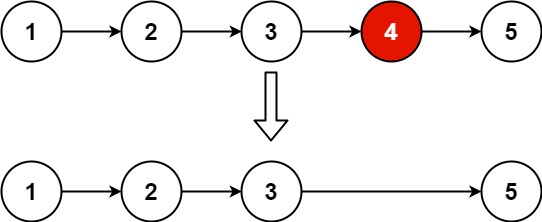0019. Remove Nth Node From End of List¶
Given the head of a linked list, remove the nth node from the end of the list and return its head.
Example 1:

Input: head = [1,2,3,4,5], n = 2
Output: [1,2,3,5]
Example 2:
Input: head = [1], n = 1
Output: []
Example 3:
Input: head = [1,2], n = 1
Output: [1]
Constraints:
- The number of nodes in the list is
sz. 1 <= sz <= 300 <= Node.val <= 1001 <= n <= sz
Follow up: Could you do this in one pass?
Analysis¶
This question can be solved using two pointers method. In order to reach the last nth position, we need to keep a subset of the LinkedList with the length of n and use it to offset the target position. Then we need to handle a special case when n = 1 and we need to remove the first element of the LinkedList.
- Time: O(n)
- Space: O(1) if ignore the dummy pointer.
Code¶
/**
* Definition for singly-linked list.
* struct ListNode {
* int val;
* ListNode *next;
* ListNode() : val(0), next(nullptr) {}
* ListNode(int x) : val(x), next(nullptr) {}
* ListNode(int x, ListNode *next) : val(x), next(next) {}
* };
*/
class Solution {
public:
ListNode* removeNthFromEnd(ListNode* head, int n) {
ListNode *a = new ListNode(-1, head), *b = head;
while (n--) {
b = b -> next;
}
// when b reaches to the end, a will be n nodes away in front of b
while (b) {
a = a -> next;
b = b -> next;
}
// what if we have only one node and we want to remove that one?
if (a -> next == head)
return head -> next;
if (a -> next)
a -> next = a -> next -> next;
return head;
}
};
Last update:
April 1, 2022